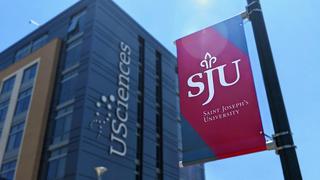Saint Joseph’s University Completes Transformative Merger, Acquiring University of the Sciences Academic Programs and University City Campus
Philadelphia’s Jesuit university adds in-demand, accredited health and sciences programs to established business and education offerings.

Driven by an intentional growth strategy, today Saint Joseph’s University completed a historic merger with the University of the Sciences, acquiring dozens of academic programs in health and science, expanding the University’s footprint in University City with state-of-the-art facilities, growing its endowment to half a billion dollars, and combining two alumni networks of nearly 100,000.
“I’m proud that Saint Joseph’s is taking this bold step to provide access to in-demand health professions programs and to strengthen our University for generations to come,” said Mark C. Reed, EdD, president. “These excellent and well-established programs in disciplines like physical therapy, occupational therapy, pharmacy and physician’s assistant allow us to meet market demand and position us for future growth in research, innovation and intellectual property development.”
Academics
With the acquisition of additional academic programs, Saint Joseph’s now offers hundreds of programs to undergraduate, graduate and adult learners, from doctoral programs to stackable credentials.
“Through this combination, Saint Joseph’s will now be able to offer students more academic offerings than ever before,” said Cheryl M. McConnell, PhD, provost. “In just one year of integration planning, our academic leadership and faculty have been able to define an academic structure with two new schools, as well as the historic Philadelphia College of Pharmacy.”
At the core of a Saint Joseph’s education is the College of Arts and Sciences. As home to the University’s general education program, the College of Arts and Sciences empowers students to develop critical thinking, creativity, clear communication skills and ethical reasoning, regardless of their major. This is the heart of the Jesuit, Catholic educational model. In addition to this strong foundation in the liberal arts, the College offers specialized programs in the arts and social and natural sciences, leading to careers in law, medicine, computer science and more. James Carter, PhD, professor in the department of history, will serve as dean.
The AACSB-accredited Erivan K. Haub School of Business — with Joseph DiAngelo Jr. ’70, EdD, professor in the department of management, continuing as dean — will now offer programs at the intersection of business and pharmaceuticals. These healthcare-oriented business programs join other noteworthy Saint Joseph’s programs including food marketing, family business, real estate, and insurance and risk management.
The new School of Education and Human Development will be led by Dean Joshua Power ’05, ’16 (EdD), professor of educational leadership. It will be home to Saint Joseph’s strong legacy of educator preparation and the renowned Kinney Center for Autism Education and Support, and it will provide unique potential for new academic programs, seen most recently with the addition of offerings in mental health and addiction counseling.
The School of Health Professions (SHP) will house the newly acquired, accredited programs in physical therapy, physician assistant, occupational therapy and pharmacy, under the leadership of Sinclair Smith, ScD, professor in the department of health sciences, as dean. The Philadelphia College of Pharmacy (PCP) will continue building on 200 years of legacy within the SHP, under the leadership of Edward Foote, PharmD, professor in the department of pharmacy practice, dean of PCP and associate dean of SHP.
Saint Joseph’s will now enroll approximately 9,000 undergraduate and graduate students, making it among the largest institutions in the Philadelphia region and among the top three largest private universities in the region. More than 400 full-time faculty will serve as hands-on scholar-mentors, empowering students to explore more of themselves and the world around them.
Two Campuses
The University expands its footprint with both city and suburban locations, totaling 161 acres. Saint Joseph’s iconic campus along City Avenue will be referred to as Hawk Hill and its newly acquired property, less than five miles away, will be referred to as the University City campus.
“Adding a second location, Saint Joseph’s takes its place in the heart of University City’s growing innovation district, offering on-campus state-of-the-art laboratories and brand-new recreation facilities,” Dr. Reed explains.
Path to Completion
In the summer of 2020, University of the Sciences engaged in a formal process to find a partner for collaboration, including the potential of a merger or acquisition. Saint Joseph's was quickly identified, invited to participate, and ultimately selected due to the highly complementary academic portfolio, geographic proximity and aligned mission. The universities signed a letter of intent to merge in February of 2021, followed by a diligent review of one another’s finances and operations. This led to a definitive agreement to merge in June of 2021.
Over the course of the last year, faculty and staff at both institutions have been planning for the combination of systems, organizational structures and finances while remaining focused on providing the best possible experience for students.
“When Saint Joseph’s was approached about this potential opportunity, we had long been eying the addition of more health and science programs for our students,” said Jim Norris ’85, chair of the board of trustees. “But what really made this merger special and successful is that we found a partner that is as focused on the student as we are here at St. Joe’s.”
In March, the University received notice that Pennsylvania’s Middle States Commission on Higher Education would alter the scope of Saint Joseph’s accreditation to include University of the Sciences’ programs, allowing the deal to be finalized in June as planned.



